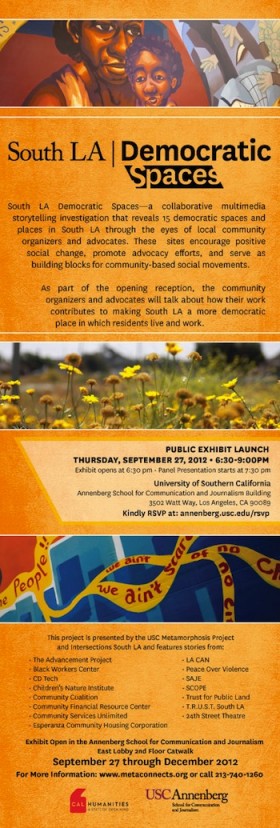When people look at questions of transportation, livable streets, or complete streets, they sometimes look at them in isolation, as if they stood alone from socio-economic issues. Slate's recent touting of LA's transit system as the next big thing, for example, never addresses questions of who is riding, how, and why. Or, why not, in the case of many Angelenos, who may find public transit cumbersome and/or have less than favorable opinions of the "public" that rides it or the neighborhoods it passes through.
Over the past nine months, I've been speaking with a number of South L.A.-based organizations who understand that making streets more livable begins with making them more accessible and democratic for all members of a community.
The stories of many of those organizations and their staff will be on display this evening at USC's Annenberg School for Communication and Journalism. The South L.A. Democratic Spaces exhibit launches tonight, from 6:30 to 9 p.m.
According to organizers, the collaborative storytelling project will offer the stories of "15 unique public spaces that embody the community’s push for social change."
Portraits and videos will offer viewers a glimpse into community organizers' favorite physical spaces from which to promote advocacy, positive social change, and community-based social movements. Far from traditional meeting rooms, some of the spaces chosen include a food truck, a marketplace, and public art sites.
The event will be interactive -- the public will have an opportunity to meet and speak with the community organizers and participate in a brief panel discussion (beginning at 7:30 p.m.) about the significance of the highlighted spaces. They hope to help participants understand that, contrary to many of the stereotypes about South L.A., there is a vibrant and active community of activists and ordinary people who work hard to make their neighborhoods more livable for all.
The Annenberg School is located at 3502 Watt Way, Los Angeles, CA 90089, on the USC campus.






